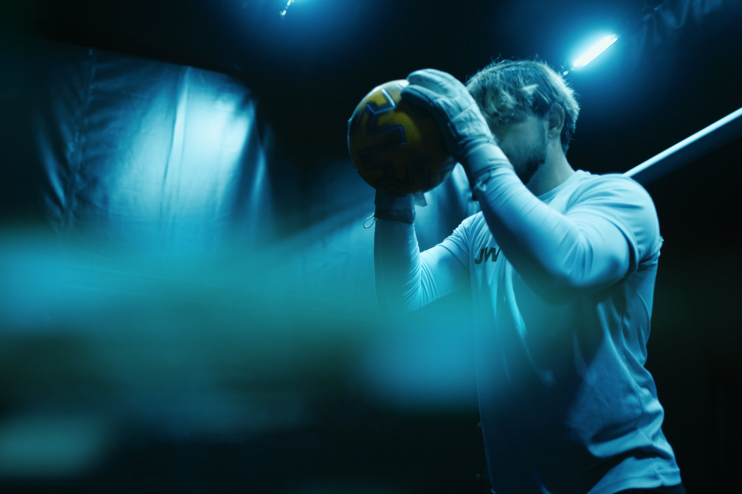The light fantastic: How Okkulo is looking to ‘re-code’ athletes’ vision

Filmmaker Mel O’Connor has had quite the story arc. He quit his job on Emmerdale and turned down work on an Idris Elba movie to follow his dream of developing an altogether different kind of visual experience.
The result is a product, Okkulo, that he believes can not only revolutionise sport science but may also aid the recuperation of people with neurological conditions.
Okkulo is a complex piece of kit but the concept is fairly simple. Train someone under certain light conditions and you can speed up their response to, say, a fast-moving ball.
It is not just a question of making their reflexes faster; they undergo a biological process that accelerates their vision. “We call it ‘re-code the athlete’,” says O’Connor. “It’s ‘see quicker, perform better’.”
After 30 minutes’ training with Okkulo, England cricketer Keaton Jennings was able to smash balls delivered at 95mph from 40ft – around two thirds the length of a normal wicket.
Trials at football club Salford City, meanwhile, helped improve goalkeeper Vaclav Hladky’s concession rate from 1.29 per game to 0.71 in four months – and earned him a move to Ipswich Town.
“His stats went through the roof: highest save percentage, highest clean sheets,” says founder and majority owner O’Connor. “It transformed him from an average goalkeeper to the best goalkeeper in the UK.”
A mixed martial arts fighter who tried Okkulo avoided being hit for three hours. “We know what we have. We’re here to change how people train.”
Football and baseball are the initial target markets for Okkulo, which formally launches this week, but O’Connor believes any sportsperson can improve their performance by training in one of the specially designed low-lit tents.
The technology has also been tested in table tennis, while the Norwegian Olympic Committee is interested in using it to hone its skiers.
Okkulo taps into sport’s increasing appetite to mine neuroscience for the next competitive edge.
“People are faster than they’ve ever been. They’re eating better than ever. They’re getting to a peak,” says O’Connor. “Arsene Wenger said the next frontier is going behind the eyes – that’s what we’re doing.”
How O’Connor went from TV to Okkulo
Developing Okkulo has been a labour of love for O’Connor, who hit on the idea around the turn of the millennium, when he was playing non-league football for local team Birtley Town on Tyneside.
The revelation, via an article in Nature magazine, that humans take a comparatively long time to process what the eye sees made him think: what if you put a ball in there?
He contacted a noted academic, who happened to be on sabbatical in the north east, to ask that very question. “I don’t know. Let’s find out,” he told O’Connor.
They started trials at Durham University with cricketers who had never hit 90mph balls before. After exposure to the Okkulo prototype, all got up to 99mph. “It was there. We knew we had something,” he says.
But honing the technology took time and O’Connor’s day job allowed him little of that. When he won an Arts Council new talent award for a short film he made, his path looked set.
He spent a decade working on Emmerdale as a costume designer until an offer of major investment that would allow him to focus full time on his side-project brought him to a career crossroads.
“I had an opportunity to do two films: an Idris Elba movie and something else. I had to either go to London and sign this deal or do Okkulo,” he says.
“I couldn’t let this slip. The opportunity is too big, I couldn’t wait. As soon as I got the investors on it was like ‘right, let’s do it’.” Since then, Okkulo has undergone intensive refinement, including in trials at Premier League clubs.
O’Connor is taking a significant step on Tuesday and Wednesday at the Leaders Sport Performance Summit. He is due to present its football and baseball products to potential clients from Europe and the US at the industry gathering at Twickenham Stadium.
“This is probably our biggest week in 20 years,” he says.
He believes it is a straightforward sell, due to the obvious performance benefits that he can point to. Still, he has enlisted a former salesperson from Catapult, maker of those inescapable GPS vests, to establish the company in elite sport and, later, at lower levels. In due course they plan performance centres around the world.
But O’Connor sees even bigger things for Okkulo. Trials threw up possible applications for survivors of brain injuries who struggle with concentration, and sufferers of ADHD.
Potentially, he says, it could help to change “not just the athlete but the person”. Collaboration with a “major company” in California’s tech heartlands is in the pipeline.
“We’re going to split Okkulo into sport and wellbeing, but that’s further down the line,” he says. “It’s mapped out how that’s going to work and very much geared towards being every school, gym, hospital and prison.
“I think we’ve opened a door. I’m nervous in a way; we’ve got to do this right. The wellbeing side, the scope is absolutely huge.”
